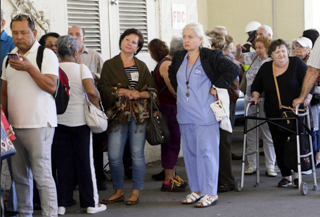Historically, Florida has advertised itself as an affordable place to retire. But with rising costs of living, some retirees have returned to the workforce out of necessity.
|
People wait in line for an application to apply for low income elderly housing at the Elderly Housing Development & Operations Corporation, Wednesday, April 19, 2017, in Miami Beach. |
“If you think about it, a typical Social
Security income, fixed income is ($1,800) or $1,900 a month.
That's eating up almost your whole check if you're getting a
median rent. I think the other thing that makes people
vulnerable is that people on fixed incomes need predictable
housing costs. You've heard already about property insurance
and condo fees going up,” Ray said on The Florida Roundup.
A recent WFSU report showed how more seniors are struggling
to keep their housing due to rising rent and insurance
costs. People on fixed incomes are especially impacted.
At the same time, Byrnes said there’s an influx of people
coming into retirement communities. Florida received about
11% of all state-to-state retirement moves in 2023,
according to U.S. Census Bureau data analyzed by HireAHelper.
“But there's reporting that current Florida retirees are
actually looking into leaving the state because of those
housing costs. So a lot of those communities are bringing in
new retirees, but losing some of the older ones,” Byrnes
said.
Ray said Florida’s growth is an opportunity for the state to
build a variety of housing.
“Oftentimes, people might be forced into a unit that's more
expensive than they can afford, because it's too big. And
that's all that's out there. So I think one thing we need to
think about is how to build homes that are smaller, or
smaller apartments in units – most older households are made
up of just one or two people – in places that are accessible
for people with disabilities, and also thinking about how we
weatherize and make that housing climate safe,” Ray
explained.
She also noted rental assistance programs seniors can take
advantage of.
“Something we have in Florida that’s special is our SHIP
program, which is state housing funding that comes to local
governments so they can meet local needs. And many times
those are going to individual homeowners for rehab to make
homes more accessible, to build ramps for weatherization.
And typically a lot of those funds will go to older,
long-standing homeowners.”
